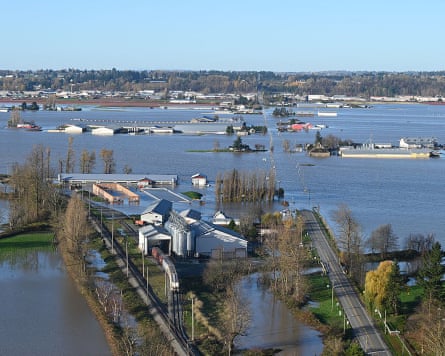‘Without our expertise, mistakes get made’: the Cop30 campaign to give workers a voice
November 18, 2025
We know that to avert the worst effects of the climate crisis, the world must reshape fundamental aspects of society – from how we eat and move around to how we turn on the lights and build homes. The transformation of energy, manufacturing, construction, agriculture and transport is creating millions of new jobs. But it’s also disrupting old roles in polluting industries.
The green transition’s effect on workers around the world is a hot topic at this year’s Cop30 climate conference here in Belém, Brazil. More on what labour and climate justice advocates are demanding, after today’s headlines.
Essential reads
-
$170,000 a minute: why Saudi Arabia is the biggest blocker of climate action
-
Climate crisis or a warning from God? Iranians desperate for answers as water dries up
-
Flooded and forgotten: the UK’s waters are rising and we’re being kept in the dark | John Harris
In focus

In the first week of Cop30, I spoke with Konrad Beston, a stormwater supervisor in south-western Canada, who is attending the talks for the first time. His field is being reshaped by global warming. “My job involves replacing infrastructure that is undersized and cannot handle the current conditions of climate change,” he told me. “And it involves protecting the wildlife affected by the changes, protecting the salmon – which is something that’s so important to me.”
Heavy rainstorms are becoming more severe and frequent in south-western Canada, he said. Then there are atmospheric river events, or long, narrow bands of vapour that pick up water from the ocean and dump it as rain. “It’s pretty much a river falling from the sky,” said Beston, who is a member of the Canadian Union of Public Employees and works in British Columbia.
All that rain has destroyed infrastructure while increasing runoff, threatening people and nature. Beston’s responsibility is to fix that, but his department is understaffed. “We’re overwhelmed, so we need more workers to come in – and workers need to have a say in how new infrastructure is getting built,” he told me.
Beston made the long journey to Brazil to advocate for workers to have a voice in climate policy. “We need workers to be a part of the plans to fix the infrastructure, to make it stronger,” he said. “We know what we’re dealing with, and without our expertise mistakes get made.”
He is backing a proposal that would make worker input a reality in UN talks. Known as the Belém Action Mechanism, or Bam, it’s the top demand by civil society groups at this year’s talks. The plan is focused on a “just transition” towards a green, resilient economy that does not leave workers or communities behind.
The just transition has been discussed in UN climate talks before and is mentioned in the preamble to the 2015 Paris agreement. But Bam proponents say countries don’t have to track or measure effects of such policies on workers or share best practices on how to protect them. Their new proposal would require countries to accelerate, coordinate and support a true global just transition.
Last week, the proposal saw a major advance when the G77 plus China – countries that together represent 80% of the world’s population – issued a call for a just transition mechanism to be created. “It was a major moment, a huge breakthrough,” Teresa Anderson, an ActionAid spokesperson, told me at Cop.
Putting meat on the bones of just transition-focused pledges could help build support for climate action, advocates say. “There’s a lot of focus on job creation, but not on the quality of those jobs, and that’s a key problem,” said Giulia Laganà, director of the International Trade Union Commission’s just transition and climate department. Workers won’t want new green jobs if they are less stable, worse paid, or offer subpar benefits to ones from the incumbent economy, she explained in Belém.
“That’s the reason why a greenlash is happening across a lot of the world,” she said. “There’s been talk at climate summits, but it isn’t happening on the ground. That’s leaving workers disillusioned, and that is something that is monetized and exploited by certain political actors to backtrack on climate commitments.”
Support for a just transition is in alignment with ancient principles, said Beston, who is Métis, one of Canada’s three legally recognised Indigenous peoples. “One thing I hold close to my heart is the seven generations teaching,” he said, referring to the belief that those making decisions today should consider their impact on the next seven generations of communities.
Many advocates for more green jobs around the world echo this notion, with Anderson noting the problems with short-term thinking, saying: “There’s an idea that considerations for workers and communities are a ‘nice to have’ thing in climate action, but that short-sightedness doesn’t get us anywhere.
“The transition needs to include those considerations to be effective.”
Read more:
-
Have courage to create fossil fuel phaseout roadmap at Cop30, Brazilian minister urges
-
Thousands hit streets of Belém to call for action during crucial Cop30 summit
Search
RECENT PRESS RELEASES
Related Post




